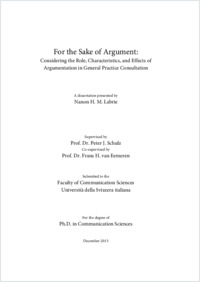For the sake of argument : considering the role, characteristics, and effects of argumentation in general practice consultation
- Labrie, Nanon
- Schulz, Peter J. (Degree supervisor)
-
06.01.2014
192 p.
Thèse de doctorat: Università della Svizzera italiana, 2014 (jury note: Summa cum laude)
General practice consultation
doctor-patient communication
patient-centered medicine
evidence-based medicine
argumentation theory
pragma-dialectics
interdisciplinary
mixed-method approach
systematic literature review
qualitative case analysis
dialectical profile
common ground
observational content analysis
randomized controlled experiment
consultation outcomes
gender
visit duration
participatory decision-making
credibility
acceptance
recall
intended adherence
English
In general practice consultation, the doctor characteristically gives the patient advice concerning the patient’s medical situation. Such advice may, for instance, pertain to a diagnosis or prognosis of the patient’s health condition, the recommended treatment plan, or the prevention of an illness. Bound by the legal rules (e.g., informed consent), ethical standards (e.g., patient centered and evidence-based medicine), and social discursive conventions (e.g., obligation-to-defend rule) that apply in the institutionalized context of medical consultation, the general practitioner is inherently obliged to support his medical advice with argumentation. By doing so, the general practitioner can simultaneously justify his medical recommendations while encouraging the patient to actively take part in the treatment decision-making discussion. This dissertation project sets out to critically examine the precise role, characteristics, and effects of doctors’ provision of argumentation to support their medical advice during general practice consultation. In a series of five research articles, both qualitative and quantitative methods are applied to explore to what extent the study of doctor- patient communication can benefit from insights gained in argumentation theory. The (extended) pragma-dialectical theory of argumentation (van Eemeren & Grootendorst, 1984; 1992; 2004; van Eemeren & Houtlosser, 2002; 2006) is used as the theoretical point of departure in this dissertation. The findings of a systematic literature review (Chapter II) demonstrate that while the use of argumentation in medical consultation is increasingly investigated by scholars from a variety scientific backgrounds, interdisciplinary, theory-driven and empirically-grounded research that takes a quantitative approach has thus far been lacking. This project aims to bridge this gap. Using qualitative methods, it studies how general practitioners can strategically use argumentation to create common ground with their patients and, as such, start the treatment decision-making discussion in a reasonable, yet favorable way (Chapter III). Furthermore, this dissertation addresses the merits of observational content analysis as a method for the quantitative examination of argumentative in context (Chapter IV). It shows that content analysis can be used to enrich the characterization of medical consultation as an argumentative activity type, to justify the exploration of certain argumentative phenomena in consultation practice, and to lay bare the correlation between general practitioners’ use of argumentation and several aspects of the communicative context (e.g., visit duration, physician gender, and communication style) (Chapter V). Lastly, by means of a randomized-controlled experiment, this dissertation establishes the causal relationships between general practitioners’ provision of reasonable argumentation to support their treatment advice and outcomes of the consultation (Chapter VI). The findings of the vignette-based study demonstrate that doctors’ use of reasonable arguments positively affects patients’ perceptions of their doctor as a credible medical expert and a participatory decision-maker. Moreover, general practitioners’ provision of reasonable argumentation has a positive effect on patients’ acceptance of, and intended adherence to, doctors’ medical recommendations. On the basis of the findings, this dissertation contributes to endeavors in the field of health communication that aim to analyze, understand, and ultimately improve the interaction between doctors and their patients. Moreover, it provides new insights to argumentation theoretical research that seeks to study the use of argumentation in context. Finally, the results have the potential to significantly influence medical consultation practice. The dissertation lays bare the importance of general practitioners’ argumentation, not only in light of legal, ethical, and social discursive standards, but also in view of consultation outcomes and, thus, pragmatic considerations.
- Language
-
- English
- Classification
- Medicine
- License
-
License undefined
- Identifiers
-
- RERO DOC 208908
- URN urn:nbn:ch:rero-006-112501
- ARK ark:/12658/srd1318544
- Persistent URL
- https://n2t.net/ark:/12658/srd1318544
Statistics
Document views: 403
File downloads:
- Texte intégral: 347
